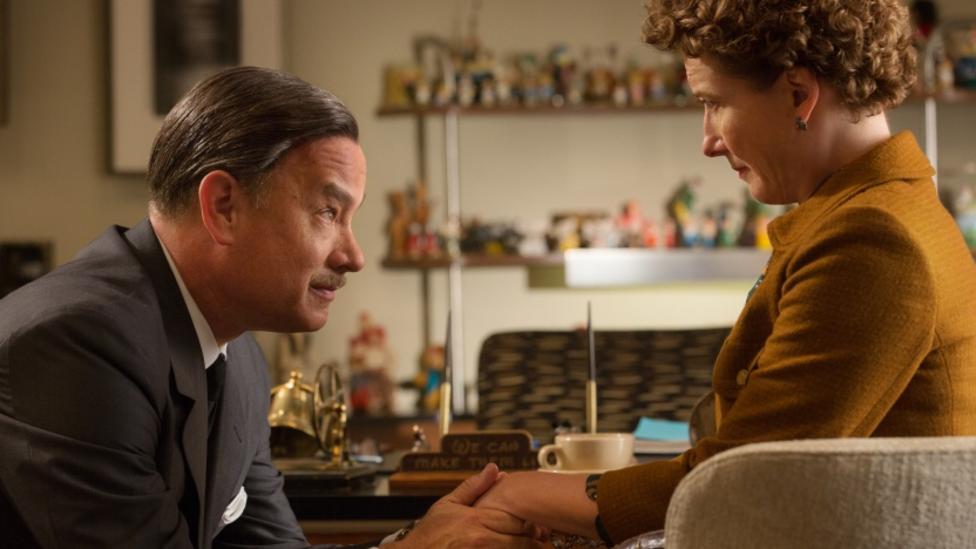Saving Mr. Banks is a fine family film hampered by some very clumsy flashback structure, and a story that may hold more resonance for students of film history and devotees of Mary Poppins than for average moviegoers. Since I happen to be among those Mary Poppins fans, I did enjoy the behind the scenes re-telling of the work that went into putting the movie together, but the main thread of the film simply isn't interesting enough to warrant being put on screen in the first place. Emma Thompson plays P.L. Travers, the author of the original Mary Poppins books, who in 1961 was courted by Walt Disney for two weeks in Los Angeles, in a struggle to obtain the film rights in order the make the 1964 classic. It was a fight they'd been having annually for the past twenty years, with Travers simply refusing to hand over her art for someone else to recreate. But in the early 60's, she was running out of money and finally forced to reconsider for financial reasons.
While in L.A., she put up quite a fight to make the film come out the way she wanted, barking orders at the writers, dismissing just about every idea that did make it into the movie (music, animation) and generally making everyone's, including Disney's, life miserable for a short time. The internal struggle she's going through over giving up the rights comes back to the source of her inspiration for the story, her own father's troubles when she was a child growing up in Australia. And this is where the biggest hurdle of the film comes in, as almost half the movie is made up of extended flashback scenes to Travers' early 1900's childhood in the outback, almost all of which are tedious and emotionally thin. Colin Farrell is her troubled, alcoholic father, the inspiration for the character of Mr. Banks in Mary Poppins, and he does a fine job in the role, but these scenes have the unfortunate occurrence of interrupting, nearly without fail, something far more interesting going on in the present.
The best scenes in the film are Travers' clashes with the screenwriter and songwriters of the movie, where they attempt to hash out the concept of the film and first introduce the memorable songs that will be soon be immortalized in our memories. Disney's in-house songwriters, the Sherman Brothers, played by B.J. Novak and Jason Schwartzman, are key to the humor and tongue-in-cheek playfulness of these scenes, and the battles with Travers can be humorous, but every time you start to become invested in this part of the film you're suddenly thrown back to Australia, where the movie falls flat for a pretty good length of time. Less flashbacks would have greatly improved the pacing of the movie and director John Lee Hancock should be blamed for failing to iron out the kinks in the screenplay (as well as the unconvincing, clear as day California backgrounds standing in for what's supposed to be turn-of-the-century Australia).
The actors themselves are very good though, and the performances of Emma Thompson and Tom Hanks do make the movie come alive in the present day setting. Thompson plays Travers very well as the cranky, fussy, uptight British woman she is, but the problem is that this character is almost impossible to make likable in any way. Some of her fussiness is amusing, but over time she becomes downright unpleasant and a pain to spend time with, even as a member of the audience. The only reason she's at all relatable is due to Emma Thompson's acting, which reveals the depth of her emotional pain as plainly as possible. And Tom Hanks is terrific as Disney, portrayed as a plainspoken midwesterner who seems to put on an act of cheeriness and charm when he's trying to get what he wants, but later shows off the hidden depth and manipulative nature of Walt as a businessman above all else. It's a clever angle to play up in order to humanize a man who's ultimately become more of a symbol and a brand, even by 1961.
The screenplay does try to make some points about the clash between art and finance, and brings up questions about whether the price of a person's integrity over their artistry is really ever worth it, and for those reasons this is worth seeing. But the awkward structure and fairly boring direction do not allow the movie to rise above merely serviceable in the end, despite the potential in the script and good performances from the actors.
* * 1/2




